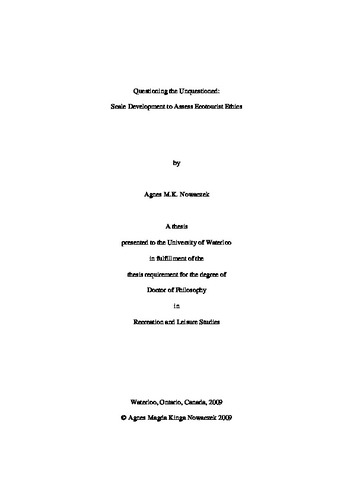| dc.description.abstract | While most ecotourist definitions and typologies have relied on concepts ingrained in traveler behaviours or destinations, none has benefited from a consideration of personal ethics. The study of ecotourism has virtually ignored theoretical considerations of ethics, other than making comparisons with the broader tourism sector. An additional shortcoming is the general lack of methodological sophistication, where the bulk of research concerning ecotourism has remained exploratory and descriptive, and has not sought to understand and explain the role that ethics have played, or not, in ecotourist behaviour and developmental practices. The assumption that ecotourists possess a higher level of ethical beliefs than mass tourists, and in fact exhibit ethical behaviour, has not been contested to a sufficient degree. Consequently, this dissertation addresses a need for more conceptually-based research to identify core ethics underlying ecotourist behaviour, with the potential to reveal where quite diverse groups, including those with different cultural orientations, are positioned on these Western philosophical stances.
Upon building a conceptual understanding of ecotourist ethics, I have developed a conceptually-driven, multi-dimensional scale – the Ecotourist Ethics Scale (EES) – based on a conceptual framework that draws on classic theories of ethics (Deontology, Teleology, and Existentialism) and on dominant components of ecotourism definitions, frameworks, and typologies (Nature, Culture, Education, and Conservation). This first phase of scale development was followed by a second phase of testing the EES for its validity and reliability with a sample of 1,544 students, and additionally, testing its concurrent validity in relation to four other established scale measures conceptually related to ecotourist ethics.
The results of employing the EES indicate ethics based on Deontology and Teleology define the prevalent ethical stances held by individuals where the focus appears to be on rules or principles and consequences, and not on the authenticity of the experience or activity. The development of a profile of travelers based on ethics, as opposed to typologies based simply on settings, behaviours, or occasionally psychographics, could not only advance our understanding of these travelers, but also provide a means for ecotour companies to implement management strategies for a more sustainable operation in response to the array of positive and negative beliefs and behaviours driven by core ethics. The dissertation concludes with a discussion of findings and their implications from analyses of an assortment of the factors related to the sample’s travel and demographic characteristics. | en |

